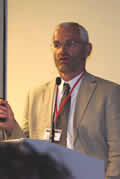WCE2005: Making centres of expertise happen
WCE2005 Seminar on Best Practise in Endometriosis:
How to lobby legislators and professional organisations effectively for the implementation of national guidelines and national centres of expertise
By Axel Forman
The challenge of endometriosis

Axel Forman, Assistant Professor, Århus University Hospital, Denmark
Endometriosis treatment is difficult, and severe cases may present very complicated clinical problems. Especially the operative treatment is technically demanding and should be performed by highly experienced surgeons only.
Moreover, a sufficient volume of patients is a prerequisite for clinical and basic research in this field. Formal centralisation, governed by national health authorities of diseases with similar characteristics, ie. gynaecological cancer, has been practiced for a long time in many countries, but such measures in the treatment of advanced endometriosis are less widespread.
Centralised treatment of endometriosis was introduced by the Danish National Board of Health in 2002.
This retrospective analysis provides us with factors which need to be taken into consideration in order to achieve similar results in other countries.
Status of the disease
Pelvic pain belongs in the group of least respected causes of impaired working and social capacity. One reason may be the general status of benign gynaecological disorders as compared to coronary heart disease and cancer that are connected with high mortality. Another significant reason is the common belief that even severe dysmenorrhoea reflects the normal cycle and should therefore be tolerated. Here it is worth noting that endometriosis has been recognised in Italy as a socially important disease.
The patient
Any patient wants the best treatment available, and confidence in the treating doctor is essential. Distance to the actual treatment centre is of minimal importance. However, the individual patient has virtually no influence on the discussion of formalised centralisation and the general status or treatment of the disease.
Patients’ societies
The establishment of national patient societies for endometriosis reflects an unsatisfactory status with the treatment of the disease, as well as the need for support with its chronic nature especially in cases of pain, infertility, and fatigue.
A primary task in promoting centralisation of treatment is to improve the status of the disease in the general public including the health authorities and within the political system. This imposes high demands on the leaders and spokeswomen of these societies, including good communications skills, professional knowledge about the disease, and abandonment from reference to personal disease.
Patient societies tend to have a high political impact, but less influence on the medical societies, where scepticism can be prevalent, until the medical societies get to know and work with professional patient societies. Unlike doctors, patient societies can initiate contact with the political system at any level in order to influence decision making.
The gynaecological society
Endometriosis has had low priority due both to the general status of the disease and the former belief that only limited treatment options were available. Any doctor wants, however, to offer the best treatment available, and to refer patients to centralised treatment centres if they are convinced that this will improve the patient’s situation.
Centralised treatment therefore pre-supposes that a better alternative is offered to the patient. For professional reasons gynaecological departments are reluctant to cut activities out, since this will impair the general service. This is especially true for advanced operative activities. Therefore, national gynaecological societies are the proper forum for discussion of the aspects of which hospital(s)/department(s) are accredited with which specialities.
Finally, the financial organisation of the health care system in relation to referral to treatment centres may play a role.
The political system
Consideration given to specific diseases in political decision making is proportional to the status of the disease awareness in the general public. In this context endometriosis has had an inferior place irrespective of the high prevalence.
The disease is benign, specific to women and also suffers from the cultural attitude against pelvic pain. Lobbyism is generally accepted in the political system as a means of influencing decision making. Within the health care system this process is open to patients’ societies, whilst doctors from potential treatment centres will have to keep their argumentation within the gynaecological society.
However, in the case of getting guidelines in place in Denmark, the discussion within the Danish Society for Obstetrics and Gynaecology (DSOG) was somewhat short circuited by the National Board of Health after a meeting between the Danish Endometriosis Society (Endometriose Foreningen) and the then Secretary of Health.
This resulted in a faster decision that “advanced endometriosis, and especially bowel and urinary tract disease, should be treated in one of two national specialist centres”. However, the down side of this approach was a low acceptance in some parts of the gynaecological society during the initial years of implementation.
The endometriosis centre
An essential prerequisite for a trouble free referral to specialist endometriosis centres is that treatment meets international standards. If the necessary expertise is unavailable, development of operative skills must take place in cooperation with centres with a high international reputation. This will also facilitate development of the scientific activities that should be an integrated part of the centre.
Future endometriosis centres should therefore be established within the context of university hospitals. The nursing staff should be specialised in the disease, and there should be access to other specialities:
- general surgeons
- bowel surgeons
- reproductive endocrinologists
- pain specialists
- counselling, etc.
Centres should also offer an open consulting service for colleagues who turn to the centre for advice in the treatment of specific patients. The endometriosis centres must be active in their communication with the gynaecological societies in order to improve understanding of the necessity of centralised treatment.
Needless to say, patient societies play a valuable and intrinsic role in providing additional patient counselling, support, and advice for these centres.
Presentations
 » Best practice in endometriosis: working together!
» Best practice in endometriosis: working together!
» They hear, but are they listening?
» Implementing specialised support programmes in hospitals
» Self management programmes in endometriosis
» Patients and scientists: essential partners in breakthrough research






